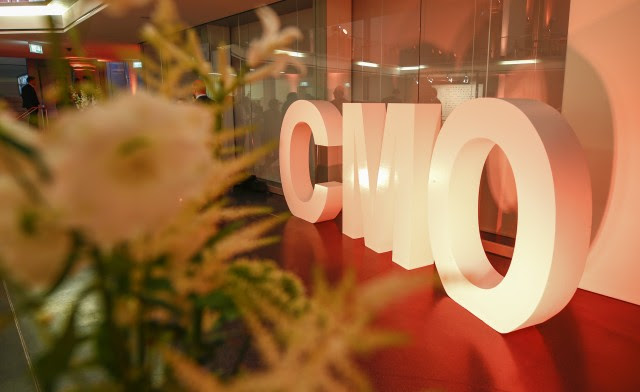
CMO Study 2017 Reveals Transformation in Every Respect

Only 6% of German CEOs and CMOs consider that enough is being done within their company to train and prepare future CMOs. Only 14% are of the opinion that CMOs give sufficient thought to how their company and business model will look in ten years' time. And just 10% state that the CMO is the point where all the elements for a successful transformation – classic marketing, data management and IT – come together, while 65% of the respondents consider the CMO to have clear responsibility here.
These are the results of a study conducted by Facit Research in collaboration with the Serviceplan Consulting Group on behalf of the Serviceplan Group. Around 100 CEOs and CMOs were surveyed on four hypotheses, which were first of all validated as part of a round table discussion with CMOs.
Alessandro Panella, Managing Director of the Serviceplan Consulting Group, explains: "The results of the study show very clearly the challenges that are facing the CMOs: In order to drive transformation forward, the role of the CMO needs to be transformed first in some places." Kerstin Niederauer-Kopf, Managing Director of market research institute Facit, adds: “It is surprising that for only 2% of those surveyed, the biggest challenge is building an ecosystem to promote the innovation process, yet 74% of the respondents consider agile learning to be one of the main requirements of today's CMOs. This type of discrepancy appears several times in the study."
On the basis of the results, the study organisers were able to identify five clear fields of action:
The new CMO agenda
1. Prepare the next generation of CMOs for a possible role as a CMO.
2. Create time and resources to look into future business models.
3. Apply real customer focus and demonstrate the ROI.
4. Focus beneficial brand experiences throughout the entire customer journey on enhancing the value of the customer relationship.
5/ Operating networks – throughout all areas relevant to marketing, both internally and externally.
The fields of action in detail
1. Prepare the next generation of CMOs for a possible role as a CMO
For 74% of the respondents, agile learning and the ability to familiarise yourself quickly with new market conditions are the most important requirements of a modern CMO. However, only 6% agree with the statement that enough is being done by companies to train and prepare future CMOs. In addition, only 2% of those surveyed regard building an ecosystem of cooperation partners that promotes agile learning and therefore the innovation process, as a challenge with regard to their own company.
2. Create time and resources to look into future business models
Only 14% of the respondents are of the opinion that CMOs give sufficient thought to how their company and business model will look in tens years' time. At the same time, 66% confirm that the CMO should have a major influence on the development of innovative business models. However, CMOs are lacking technical and financial resources. Only 19% agree that there is sufficient technology available to CMOs to quickly test and simulate innovative ideas, and a mere 18% believe that sufficient financial resources are provided for driving innovation.
3. Apply real customer focus and demonstrate the ROI
81% of the marketing managers surveyed are convinced that marketing performance will become more and more important in the future. And 69% believe that the CMO must understand customers not only qualitatively through insights, but also quantitatively through data analysis. This reflects the spirit of the times. The necessary consistency is still lacking for both approaches, which have been waiting to be fulfilled for years. Only 28% state that data ownership, which makes it possible to act in the interests of well-developed customer centricity, lies within the sphere of influence of the CMO. And just 23% confirm that the current possibilities of digital transformation are being fully exploited by the CMO for more valuable customer relationships.
CMO quote: "They must become the driver of strategy and ROI. A CDO or Growth Officer isn’t needed if the CMO is good and not only shapes the brand/image, but also the business."
4. Focus beneficial brand experiences throughout the entire customer journey on enhancing the value of the customer relationship
For almost 70% of the respondents, beneficial brand experiences are the aim of a successful transformation process. For 63%, the importance of brand experience is increasing significantly, as digitisation means that the interaction time between the consumer and brand is reduced. However, just 25% of the respondents said that transformation had succeeded in creating a beneficial experience along the customer journey. The complexity of the subject is well known and it remains the CMO's Achilles’ heel. Probably because for 40% of the respondents, a unified and cross-departmental understanding of the desired brand experience is still lacking.
CMO quote: "The responsibility of the CMO lies in thinking along the customer journey, from the customer point of view and in the interests of the customer. Not digitisation for the sake of digitisation, but with added value for end customers."
5. Network yourself, network your data – throughout all areas relevant to marketing, both internally and externally
The networking of online and offline interfaces as an essential tool for a successful digital transformation achieved the highest figure of the whole study, with 89% of respondents. In addition, just under 60% of the respondents believe that networking is also the most important CMO quality for a successful transformation. In this context, for 79%, the first priority is networking of data, for 70%, internal networking within the company, for 68%, networking with other CXOs, and for 64%, networking of technical systems. Networking across all relevant areas, as all the CMOs agree, is essential. And at this point it becomes clear that the CMOs are on the right track.
CMO quote: “Integrator and driving force in a networked structure, cooperative leadership for all sub-disciplines in the range of marketing tools, great affinity for digital channels, excellent evaluation skills for creative results, customer proximity."
Summary
While equal importance was accorded to all five fields of action by the experts Kerstin Niederauer-Kopf and Alessandro Panella, the last field of action seems to have the most relevance for the CMOs themselves with regard to the role as a driver of transformation: In an age of agile organisations and crowd innovation, the CMO is facing the challenge of creating the added value for their company across all content, processes, hierarchies and organisational structures.
The experts are unanimous – "If the CMOs manage to consistently continue pursuing this type of networking internally and to transfer it to external relationships, they will create a tremendous environment in which they will stay longer, in which transformation is a synonym for motivation and in which innovative business models and beneficial brand experiences are an inevitable result of this networking."
The study design
The CMO study essentially focuses on precisely those areas of influence that have the most relevance for the CMOs in terms of driving forward the transformation currently taking place. In a round table discussion with selected CMOs that took place in May 2017 under the leadership of Kerstin Niederauer-Kopf and Alessandro Panella, the CMOs’ significant areas of influence were identified and supplemented with their respective drivers and barriers.
The following four hypotheses were validated:
- Only the CMO can be the real advocate of customer centricity and therefore ensure that transformation creates added value for customers.
- Marketing must establish itself as the incubator of new business models within the company, so that the transformation leads to more growth.
- Successful transformation processes must lead to beneficial brand experiences.
- To ensure a successful transformation, networking is possibly the most important activity for a CMO.
For the subsequent quantification, 100 marketing decision-makers of the first and second management level from various fields of the B2B and B2C sectors took part in a comprehensive online survey.
The study experts
Alessandro Panella:
As Managing Director of the Serviceplan Consulting Group, Alessandro manages strategy for the whole Serviceplan Group. He has more than 20 years' experience of agency, industry and management consulting. Thanks to his international profile, he has provided strategic advice to more than 50 global brands during his career, working closely with CMOs and marketing decision-makers.
Kerstin Niederauer-Kopf:
As Managing Director of Facit, Kerstin is responsible for the operational management and strategic development of the market research company. Prior to this, she was Head of the Advertising and Market Research Department of ARD-Werbung Sales & Services GmbH (AS&S) and acted as a member of the Research Council at the Television Research Working Group (Forschungsbeirat der Arbeitsgemeinschaft Fernsehforschung (AGF)) and of the Working Committee of the Media Analysis Consortium (Arbeitsgemeinschaft Mediaanalyse (agma)).
The sponsors of the CMO Study
The CMO Study 2017 was conducted with sponsorship from Stefan Schütte, Managing Director of the Holding advertising agencies and sponsor of the CMO of the Year Council, as well as from Klaus Schwab, Managing Director of Plan.Net Holding. Their comments on the results of the study:
Stefan Schütte says: "The breathtakingly disruptive forces that are exerted on the CMOs of today, call for different and more effective partners than before. Innovation, integration and future viability must be more consciously obtained from outside the company by the CMOs. For us as an agency group this means that our work needs to be more KPI-focused and we have to interlink more closely and smoothly with our customers' processes. And that we will have to take a lot more responsibility for the overall result.”
Klaus Schwab adds: “The role of the CMOs is changing. Together with the CEO, they are faced with responsibility for the future viability and success of the company in the digital age. Key skills of the CMO are the ability to network and collaborate, i.e. to network numerous and sometimes opposing disciplines with one another. These include analogue and digital, brand and performance marketing, marketing and technology, brand and customer, data and customer insight, product development and marketing and, last but not least, classic methods and new ways of thinking and working. The CMO evolves from the decision-maker into the visible networker – internally and externally."













